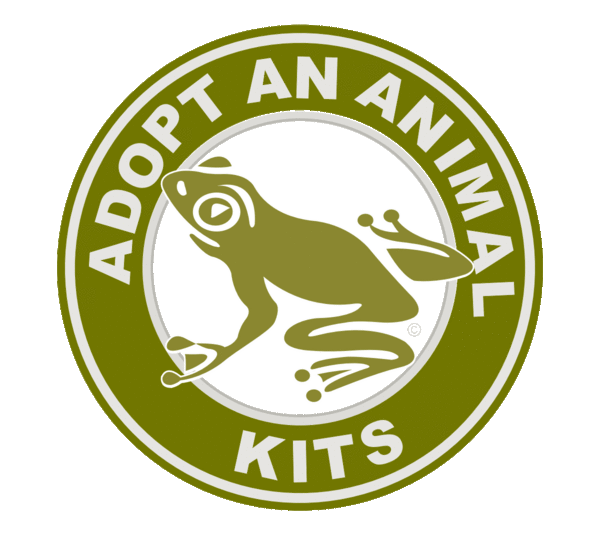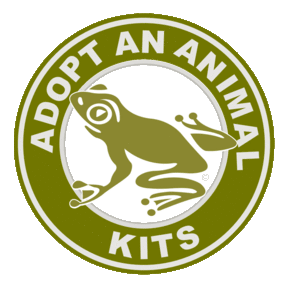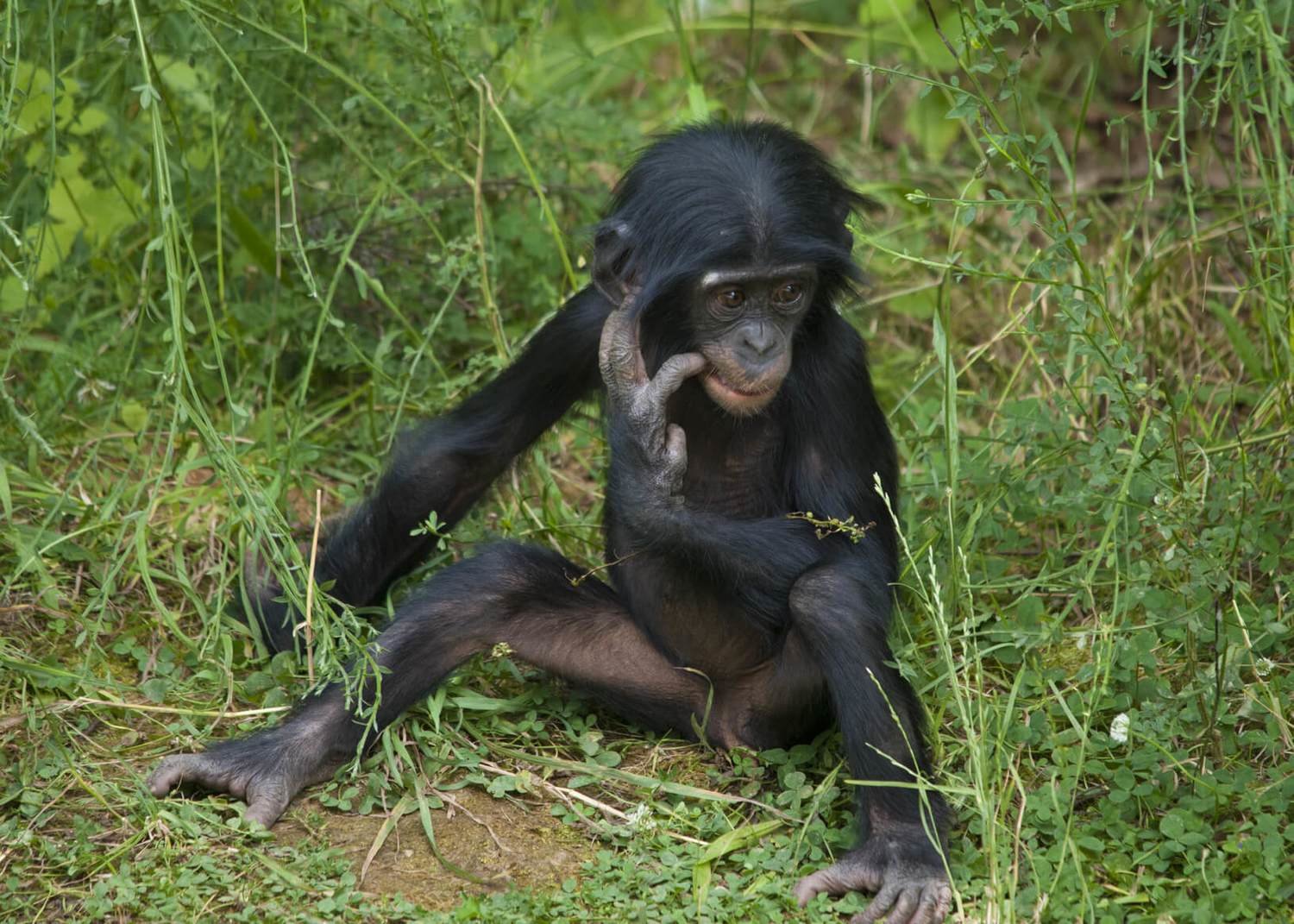

Adopt An Animal Kits
Adopt An Animal symbolically. Your Adopt An Animal Kit comes in a Deluxe Folder and includes: Glossy Photo of Your Adopted Animal; Adopt An Animal Adoption Certificate; Fact Sheet About Your Adopted Animal; Help Animals Info Cards Packed With Information On Animal Issues & How You Can Help Animals And The Environment. Adopt An Animal for Yourself or as a Gift.
Adopt A Bonobo
Adopt A Bonobo
Your Adopt A Bonobo Kit comes in a Deluxe Folder and includes:
- Glossy Photo Of Your Adopted Bonobo
- Adopt A Bonobo Adoption Certificate
- Fact Sheet About Your Adopted Bonobo
- Help Animals Info Cards Packed With Information On Animal Issues & How You Can Help Animals And The Environment
Adopt A Bonobo Kits make great gifts and can be sent directly to the recipient. Simply supply the recipient's name and mailing address as shipping information. We'll even include a letter stating the Adopt An Animal Kit is from you.
Adopt An Animal symbolic adoption is a one time fee. Adopt an animal for yourself or order an Adopt An Animal Kit as a gift. Help make a difference for animals - Adopt An Animal Today!
Adopt A Bonobo
Adult female bonobos are somewhat smaller than adult males. Males range from 75 to 132 lb; females average 66 lb. The bonobo's head is relatively smaller than that of the common chimpanzee with less prominent brow ridges above the eyes. It has a black face with pink lips, small ears, wide nostrils, and long hair on its head that forms a part. The bonobo also has a slim upper body, narrow shoulders, thin neck, and long legs when compared to the common chimpanzee.
There are significant brain differences between bonobos and chimps. The brain anatomy of bonobos has more developed and larger regions assumed to be vital for feeling empathy, sensing distress in others and feeling anxiety, which makes them less aggressive and more empathic than their close relatives. They also have a thick connection between the amygdala, an important area that can spark aggression, and the ventral anterior cingulate cortex, which helps control impulses. This thicker connection may make them better in regulating their emotional impulses and behavior.
Bonobos are both terrestrial and arboreal. They travel on ground by quadrupedal knuckle walking, and occasional bipedal walking. Physical characteristics and posture give the bonobo an appearance more closely resembling that of humans than that of the common chimpanzee.
The bonobo also has highly individuated facial features, as humans do, so that one individual may look significantly different from another, a characteristic adapted for visual facial recognition in social interaction.
The bonobo is an omnivorous frugivore; 57% of its diet is fruit, but this is supplemented this with leaves, honey, eggs, meat from small vertebrates, and invertebrates.
Bonobos are capable of altruism, compassion, empathy, kindness, patience, and sensitivity. Females have a higher social status in bonobo society. Females have strong social bonds amongst themselves, but they do not exclude males. Aggressive encounters between males and females are rare, and males are tolerant of infants and juveniles. A male derives his status from the status of his mother. The mother–son bond often stays strong and continues throughout life. While social hierarchies do exist, rank plays a less prominent role than in other primate societies.
Bonobo party size tends to vary. A community of approximately 100 will split into small groups during the day while looking for food, and then will come back together to sleep. They sleep in nests that they construct in trees. Bonobos have a male philopatric society; males remain with their birth group whereas females migrate to other groups during adolescence.
Daily activities of bonobos includes feeding in trees, travel, foraging, nest-building, rest, and group excitement. Bonobos travel 13% of the day, forage 20% of the day, feed 20% of the day, and rest about 43% of the day. The remaining time is spent doing other various activities. The average daily travel distance of a bonobo is 1.24 miles.
Sexual activity generally plays a major role in bonobo society, being used as a greeting, a means of forming social bonds, a means of conflict resolution, and postconflict reconciliation. Bonobos do not form permanent monogamous sexual relationships. They also do not seem to discriminate in their sexual behavior by sex or age, with the possible exception of abstaining from sexual activity between mothers and their adult sons. When bonobos come upon a new food source or feeding ground, the increased excitement will usually lead to communal sexual activity, presumably decreasing tension and encouraging peaceful feeding. Bonobos prefer sexual contact over violent confrontation with outsiders. They are known to be extraordinarily peaceful, and often resolve conflicts with sexual contact.
The gestation period of bonobos is on average 240 days. Female bonobos carry and nurse their young for four years and give birth on average every 4.6 years.
Bonobos communicate primarily through vocal means. They are the most vocal of the great apes, using complicated patterns of vocalizations to communicate detailed information. Humans are able to easily understand their facial expressions and some of their natural hand gestures, such as their invitation to play.
Bonobos are known for using tools, including using leaves as cover for rain and brandishing branches in social displays. They make a new nest for sleeping each night, and sometimes construct a nest during the day. Most nests are made in trees, but occasionally ground nests are constructed. As seed dispersers, bonobos play an important ecological role in forest regeneration.
Bonobos typically live 40 years in captivity; their lifespan in the wild is unknown.
THREATS TO BONOBOS
It is estimated there are between 29,500 and 50,000 bonobos. The species is listed as Endangered on the IUCN Red List and is threatened by habitat destruction and human population growth and movement. The bonobo population is believed to have declined sharply in the last 30 years. Because bonobos only bear offspring every 4 to 5 years, the population is slow to regenerate.
Bushmeat hunting is the greatest threat to bonobos. 90% of humans in the region where bonobos live can only afford to eat one meal a day. They are increasingly turning to wild sources of meat for sustenance. They also hunt bonobos for profit in the commercial bushmeat trade.
The Congo is setting aside more than 11,000 square miles of rainforest to help protect the endangered bonobo, and U.S. agencies, conservation groups, and the Congolese government have come together to set aside 11,803 square miles of tropical rainforest. However, a reserve may need to be established in a more stable part of Africa, or on an island in a place such as Indonesia, to save bonobos.
Adopt Adopt An Animal Kits
Our Adopt An Animal Kits are educational packets that allow you to symbolically adopt a favorite animal species and contain a variety of information promoting the protection of wildlife, companion animals, farm animals and the environment. By purchasing a symbolic adoption kit you will receive a packet of information regarding daily choices you can make to help the earth and animals.
Your Adopt An Animal Kit comes in a Deluxe Folder and includes:
Glossy Photo Of Your Adopted AnimalAdopt An Animal Adoption CertificateFact Sheet About Your Adopted AnimalHelp Animals Info Cards Packed With Information On Animal Issues & How You Can Help Animals And The Environment.
Adopt an animal for yourself or order an Adopt An Animal Kit as a gift. Symbolically adopting an animal is the perfect gift for a loved one who loves animals, and helps to promote the compassionate treatment of animals and respect for the environment by offering information on how to help the earth and animals. Adopt An Animal Kits can be sent directly to the recipient: simply supply the recipient's name and mailing address as shipping information. We'll even include a letter stating the Adopt An Animal Kit is from you.
Adopt An Animal Kits is a small, independent business not affiliated with any other business, non profit or charitable organization.
Fast Shipping!
Shipping time for Adopt An Animal Kits averages 2 to 4 business days - USA. Allow additional time for Adopt An Animal Kits orders outside the USA. Your Adopt An Animal Packet will arrive approximately 2 to 4 business days following shipping date. Shipping for Adopt An Animal Kits within the USA is by U.S.P.S. Priority Mail.
INTERNATIONAL ORDERS: Average shipping time for Adopt An Animal Kits outside of the USA is 5 to 14 business days, including Canada. International Shipping & Handling for Adopt An Animal Kits is by U.S.P.S. First Class Mail.
About Us

Adopt An Animal Kits, LLC
The world is teaming with an amazing diversity of animals. Some species are beautiful, others bizarre — but they all are important to the ecosystem and deserve our respect, compassion and protection. Unfortunately, many animal species are declining at a rapid rate as a result of irresponsible human activities. Habitat destruction, pollution, hunting, poor agricultural practices and changes in climate are among the threats faced by wildlife and domestic animals.
Adopt An Animal Kits, LLC is a small business who believes in promoting the advancement of compassionate living by educating the public about animal and environmental issues and what individuals can do to prevent cruelty to animals. Through our work, we strive to eliminate the prejudice of animals (speciesism) through educational efforts. Our business produces printed and printable educational materials available to individuals with an interest in earth and animal topics. Our Adopt An Animal Kits seek to educate and influence individuals on environmental and animal issues. The purchase of an Adopt An Animal Kit allows you to symbolically adopt your, or your loved one's, favorite animal species while promoting the protection of wildlife, companion animals, farm animals and the environment. Rather than adopting an indivdual animal, you are symbolicly adopting the species. Each kit contains a collection of information on how you or your loved one can make daily choices to help animals and the environment.
Our website provides an information portal regarding these issues. Information posted on the site is free of charge and available to anyone with an interest. Our printed and printable materials are available to individuals with an interest in earth and animal issues. We produce hundreds of fact sheets, flyers, and digital materials regarding environmental and animal issues. Most materials are available at no cost to anyone with an interest.
Adopt An Animal Kits, LLC is not a charitable or nonprofit organization.

